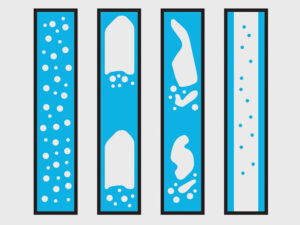Achieving Mechanical Integrity Excellence in Hydroprocessing Units
Achieving reliable, predictable performance in hydroprocessing (HP) units requires more than basic familiarity with equipment—it demands a clear understanding of how process conditions, materials, and operating practices interact to drive mechanical integrity (MI) outcomes. This course provides participants with a practical, process-focused understanding of HP unit operation and the most prevalent damage mechanisms (DMs) that […]
Achieving Mechanical Integrity Excellence in Fluid Catalytic Cracking Units
Mechanical integrity (MI) in fluid catalytic cracking units (FCCUs) is challenged by complex process conditions, high temperatures, and a diverse range of damage mechanisms (DMs)—but these challenges can be managed with the right knowledge. This course equips participants with a working understanding of FCCU operation and the fixed equipment vulnerabilities that arise from common process […]
Welding for Mechanical Integrity Professionals
Welding plays a critical role in the integrity and long-term reliability of pressure equipment and piping, and understanding its fundamentals is essential for anyone supporting mechanical integrity (MI) programs. This course equips participants with a practical understanding of welding technology, giving MI, reliability, inspection, and engineering personnel the knowledge needed to make informed decisions about […]
Corrosion Under Insulation: Finding, Assessing, and Preventing Damage
Corrosion under insulation (CUI) remains one of the most costly and persistent challenges to fixed equipment mechanical integrity (MI)—but it doesn’t have to be. This course gives participants the practical knowledge and tools to locate susceptible areas, uncover hidden damage using proven non-destructive examination (NDE) techniques, and evaluate remaining life with Fitness-for-Service (FFS) methodologies from […]
Fixed Equipment Mechanical Integrity Programs
This course delivers a powerful introduction to fixed equipment mechanical integrity (FEMI) by showing how past industrial events shaped the modern standards that protect people, facilities, and production today. Participants will explore the essential equipment used in processing hazardous materials and uncover how it degrades, how damage is detected, and why qualified inspectors and engineers […]
Damage Mechanisms in the Chemical & Petrochemical Industries
Elevate your knowledge of damage mechanisms (DMs) affecting fixed equipment in the chemical and petrochemical industry with this comprehensive course, based on API RP 571. Gain insight into how these DMs impact major process units, where they are commonly observed, and the specific process environments or equipment where they manifest.
API 520/521 Pressure Relieving Systems
Broaden your understanding of pressure relieving systems with our most sought-after course, led by the renowned Phil Henry, the long-time Chairman of the API Pressure Relieving System Subcommittee Task Force and Master Editor of API 520. This training combines in-depth technical knowledge with real-world application, making it a must-attend for processing industry professionals.
API 579-1 / ASME FFS-1 Fitness-for-Service
Unlock the tremendous value that Fitness-for-Service (FFS) technology provides in our comprehensive training course, designed to immerse you in the principles and application of API 579-1/ASME FFS-1. With a focus on Level 1 and Level 2 assessment procedures, this course delivers the knowledge and insights needed to confidently assess fixed equipment integrity to make informed […]
Pressure Vessels: ASME VIII-1
Gain a solid, practical understanding of pressure vessel design with this in-depth training course, focused on the requirements of the ASME Boiler & Pressure Vessel Code, Section VIII, Division 1 (ASME VIII-1). Learn the Code's organization and its key content, including its general requirements, component design, materials, fabrication, and testing procedures. Build competency in the […]
API 580/581 Risk-Based Inspection
Gain a comprehensive understanding of Risk-Based Inspection (RBI) with this API-branded course, designed to equip you with the principles, methodologies, and best practices outlined in API RP 580 and 581. With a strong focus on API RP 581 technology, this training delves into evaluating processing equipment by analyzing probability of failure, consequence of failure, and […]
PlantManager SAGE with FFS Applications
This PlantManager SAGE training course provides training specific to the PlantManager SAGE suite of analytical tools used to evaluate pressure-containing equipment such as process vessels, piping, and storage tanks. The course will cover the structure of the PlantManager SAGE software and is designed to develop skills in its navigation and use. The software can be […]
Bolted Flanged Joint Integrity: Design, Evaluation, and Optimization
Achieving leak-free performance in bolted flanged joints (BFJs) requires more than just tightening bolts—it demands a solid understanding of the mechanics, design rules, and assembly practices behind every BFJ. This course demystifies how torque translates to load and how each component contributes to overall joint integrity. Participants learn to apply ASME Section VIII-1 Appendix 2 […]




